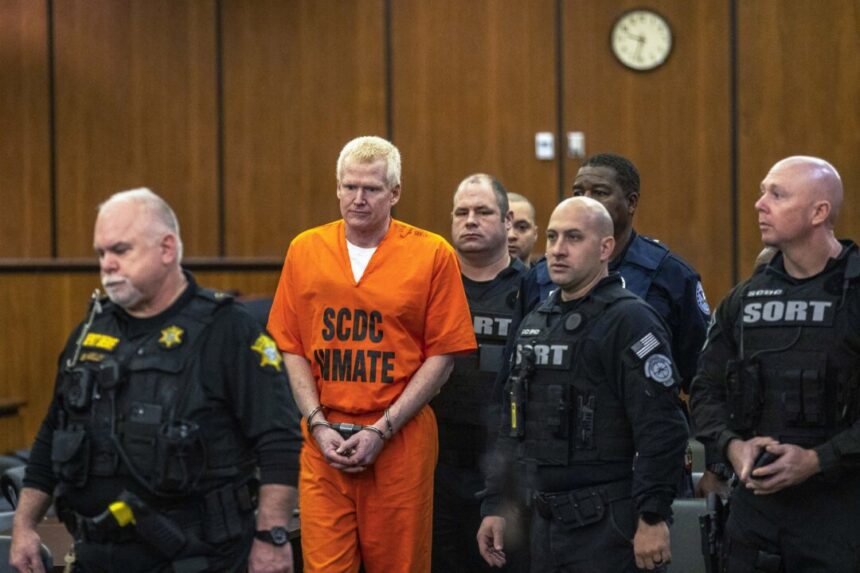The Department of Justice (DOJ) has filed a motion to dismiss Alex Murdaugh’s appeal of his federal sentence for financial crimes.
Murdaugh, the South Carolina lawyer who is already serving two life sentences for killing his wife and son, was sentenced on April 1 at a Charleston, South Carolina, court to 40 years in prison for financial crimes after pleading guilty to more than a dozen charges, including bank fraud and money laundering.
In mid-April, Murdaugh’s attorneys appealed the financial crimes sentence and on Aug. 8, U.S. Attorney for the District of South Carolina Adair Boroughs filed a motion at the 4th Circuit Court of Appeals asking the court to dismiss the appeal.
Boroughs argued in the filing that Murdaugh latched on prosecutors’ comment at sentencing that the federal financial charges served as a “backstop” and, based on this, that Murdaugh is arguing that his 40-year sentence is too harsh because it was actually meant to punish him for the murders.
The U.S. attorney said this claim is without merit and that prosecutors had explained why they charged him with financial crimes even though he was already serving two consecutive life sentences.
“Murdaugh committed two sets of heinous crimes: he executed his wife and son, and he stole over $10 million from people who trusted him,” Boroughs wrote. “He should be punished for both.”
Boroughs added that the “backstop” wasn’t to make sure that Murdaugh would serve time for the murders if those convictions were vacated, but to make sure he would be held accountable “for his 15 years of fraudulent conduct in the event his murder convictions are overturned.”
The U.S. attorney also rejected Murdaugh’s claim that the district court erred by imposing a de facto life sentence without conducting a proportionality review and by imposing a disproportionate sentence, in alleged violation of his constitutional rights under the Eighth Amendment.
Boroughs argued that the Eighth Amendment prohibits extreme sentences that are grossly disproportionate to the crime but it does not require strict proportionality between the crime and sentence, adding that the court had carried out a “threshold comparison” and found no such inference of gross disproportionality in Murdaugh’s case.
“It is just and wholly deserved,” the U.S. attorney said.
Finally, Boroughs argued on technical grounds that Murdaugh’s appeal should be tossed because, as part of the plea deal he entered into in September 2023, Murdaugh waived the right to appeal his conviction.
“Murdaugh’s appeal waiver is valid, and both of his claims fall within its scope,” Boroughs wrote. “The United States respectfully requests this Court dismiss his appeal.”
Murdaugh’s attorneys did not immediately respond to a request for comment on the motion to dismiss his appeal.
In addition to the 40-year sentence imposed on April 1, Murdaugh was ordered to pay more than $8.7 million in restitution to his financial victims.
The 55-year-old disbarred attorney is also serving life without parole in state prison after a jury found him guilty of murder in the shootings of his wife and younger son.
In November 2023, Murdaugh pled guilty to 22 total counts, including money laundering, breach of trust, and financial fraud.
The latest penalty came after federal prosecutors asked a federal judge to revoke a separate plea deal with Murdaugh and, as even more insurance, to give him a maximum of well over 100 years in prison.
A prominent personal injury lawyer, Murdaugh was found guilty in March 2023 of murdering his wife Maggie, 52, and their son Paul, 22.
State prosecutors accused him of killing the mother and son to gain pity and to distract from financial crimes that could jeopardize the reputation of the Murdaughs, a legal dynasty that held the local prosecutor’s office for three successive generations.
During his high-profile double murder trial, Murdaugh took the stand to deny that he killed his wife and son but admitted to some financial misconduct.
Bill Pan contributed to this report. Can you please rewrite this sentence?
Source link





